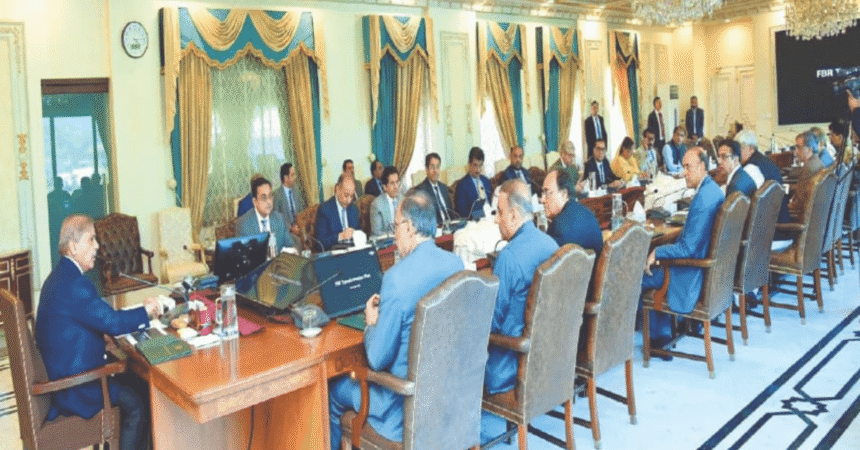Introduction
In a significant move to bolster tax compliance and enhance revenue generation, Prime Minister Shehbaz Sharif has approved sweeping measures aimed at enforcing tax laws more rigorously in Pakistan. This initiative includes a ban on all banking and financial transactions for non-filers of tax returns, a step that could dramatically alter the landscape of tax compliance in the country.
The approval comes as part of the Federal Board of Revenue (FBR) Indigenous Transformation Plan, which has been developed by over 50 tax officers and experts over the past 40 days. This article explores the details of the approved measures, their implications for the economy, and the broader context of tax collection in Pakistan.
Overview of the FBR Indigenous Transformation Plan
The FBR’s transformation plan aims to address structural challenges that have historically impeded revenue growth in Pakistan. Key components of the plan include:
- Reduction of Cash Circulation: The plan seeks to bring down the amount of cash currency in circulation to levels comparable to regional peers. Currently, Pakistan has 25% of its currency in circulation, whereas neighboring countries like Bangladesh and India operate at 14%, and Malaysia at 7%. Reducing cash in circulation is intended to increase transparency and reduce tax evasion.
- Tax Compliance Measures: The plan does not propose new revenue measures to meet the estimated budgetary target of Rs12.970 trillion for FY25. Instead, it focuses on closing existing loopholes, particularly regarding under-declaration of income and improper payments under income tax.
- Documentation of the Economy: One of the primary objectives is to document the economy effectively. To this end, stringent restrictions will be imposed on non-filers, including prohibiting them from acquiring vehicles, immovable property, and financial instruments, with limited exceptions.
Restrictions on Non-Filers
Under the new policy, a tiered approach has been established based on the declared income of individuals and businesses. Key elements include:
- Prohibitions for Non-Filers: Non-filers will be barred from purchasing cars, real estate, and financial instruments or opening standard bank accounts, with an exception for an “Asaan Account,” which is designed to facilitate basic banking services.
- Income Thresholds: Those who have declared an income exceeding Rs10 million will be eligible for various benefits and exemptions. Conversely, individuals declaring income below this threshold must justify the source of their funds when making significant purchases.
- Current Registration Status: Alarmingly, only 14% of manufacturers are registered for sales tax, while registration rates for income tax are even more concerning—only 25% of wholesalers and a mere 8% of retailers are registered. This under-registration highlights a significant challenge in the tax system that the new measures aim to address.
Implementation Strategies
The plan includes several enforcement strategies designed to enhance compliance and document the economy effectively:
Digital Invoicing and Tracking
- Digital Invoicing: To keep track of unregistered purchasers, the FBR will implement digital invoicing systems. This approach allows for real-time tracking and better oversight of transactions.
- Notices and Penalties: Unregistered entities will receive notices and face severe penalties for non-compliance, which may include fines and restrictions on business operations.
Freezing of Bank Accounts
- Account Freezing: A radical measure proposed in the plan involves freezing the bank accounts of unregistered manufacturers, wholesalers, and retailers. For manufacturers with an annual turnover of Rs250 million and for retailers with a turnover of Rs100 million, bank accounts will be frozen if they fail to register.
- Severe Penalties: Both groups would also face a new penalty of Rs1 million for non-compliance. These measures are aimed at incentivizing registration and compliance.
Incentives for Tax Officers
To ensure effective implementation of the transformation plan, the FBR plans to offer incentives to tax officers based on their integrity and performance:
- Integrity and Performance Metrics: Tax officers’ incentives will be calculated based on 60% integrity and 40% performance metrics. This will promote ethical behavior and effective performance among tax officials.
- Regular Assessments: FBR will create integrity indexes to regularly evaluate the performance and ethical standards of its officers.
Focus on Major Taxpayer Units
The first phase of the plan involves stationing efficient and competent officers in Karachi, the largest taxpayer unit in the country, responsible for 32% of total tax collections. These officers will work alongside auditors and specialists to enhance the efficiency of tax collection in this critical area.
Government Support and Stakeholder Engagement
During the announcement, Prime Minister Shehbaz Sharif commended the FBR’s restructuring strategy and emphasized the importance of increased tax collections in enhancing service delivery and improving the social sector. He described taxation as “the backbone of the national economy,” highlighting its critical role in national development.
Consultation with Taxpayers
The prime minister directed the FBR to engage with prominent taxpayers to refine the implementation plan and ensure that amendments receive the necessary approvals from relevant government departments. This collaborative approach aims to foster a sense of ownership among taxpayers and enhance compliance.
Third-Party Audits and Monitoring
Additionally, Sharif called for third-party audits of FBR projects to ensure transparency and accountability. This step aims to instill greater confidence in the effectiveness of tax collection efforts.
Curbing Smuggling and Duty Theft
The FBR will also implement new measures to combat customs duties theft. An appraisal and enforcement mechanism will be introduced, allowing inspectors to conduct assessments without prior notice, monitored via surveillance cameras. This initiative seeks to enhance the integrity of customs processes and improve revenue collection.
Implications for the Economy
The measures outlined in the FBR Indigenous Transformation Plan have significant implications for Pakistan’s economy:
Enhanced Revenue Generation
By increasing tax compliance and reducing the informal economy, the government aims to bolster its revenue base significantly. This is crucial for funding essential public services and social welfare programs, which have been under strain due to budgetary constraints.
Documentation of the Economy
The push towards documenting the economy will help increase transparency and accountability in financial transactions. This could lead to improved business practices and potentially attract foreign investment, as investors prefer environments with clear regulatory frameworks.
Challenges Ahead
Despite the ambitious nature of the proposed measures, several challenges remain:
- Resistance from Non-Filers: The new restrictions on non-filers may encounter pushback from those unwilling to comply. The government must ensure that the enforcement mechanisms are robust yet fair to minimize resistance.
- Implementation Difficulties: Effective implementation of these measures will require substantial training and resources. Ensuring that tax officers are well-equipped to handle the new responsibilities is critical for success.
- Public Trust: Building public trust in the tax system is essential. The government must communicate effectively about the benefits of compliance and ensure that the collected revenues are utilized for public welfare.
Conclusion
Prime Minister Shehbaz Sharif’s approval of drastic tax enforcement measures represents a bold step toward enhancing tax compliance and increasing revenue generation in Pakistan. The FBR Indigenous Transformation Plan aims to address long-standing structural issues within the tax system while promoting transparency and accountability.
While the proposed measures hold significant promise for improving tax compliance, their success will depend on effective implementation, public cooperation, and ongoing dialogue with stakeholders. As Pakistan navigates this challenging terrain, it is crucial to prioritize user-friendly systems that facilitate compliance while ensuring the fair treatment of all taxpayers.
The long-term sustainability of these reforms will ultimately hinge on the government’s ability to build public trust and demonstrate the positive impact of enhanced tax collections on society as a whole.
#Pakistan #TaxReform #FBR #PrimeMinister #ShehbazSharif #TaxCompliance #EconomicPolicy #RevenueGeneration #PublicFinance #Transparency #BankingRegulation #BusinessIntegrity







